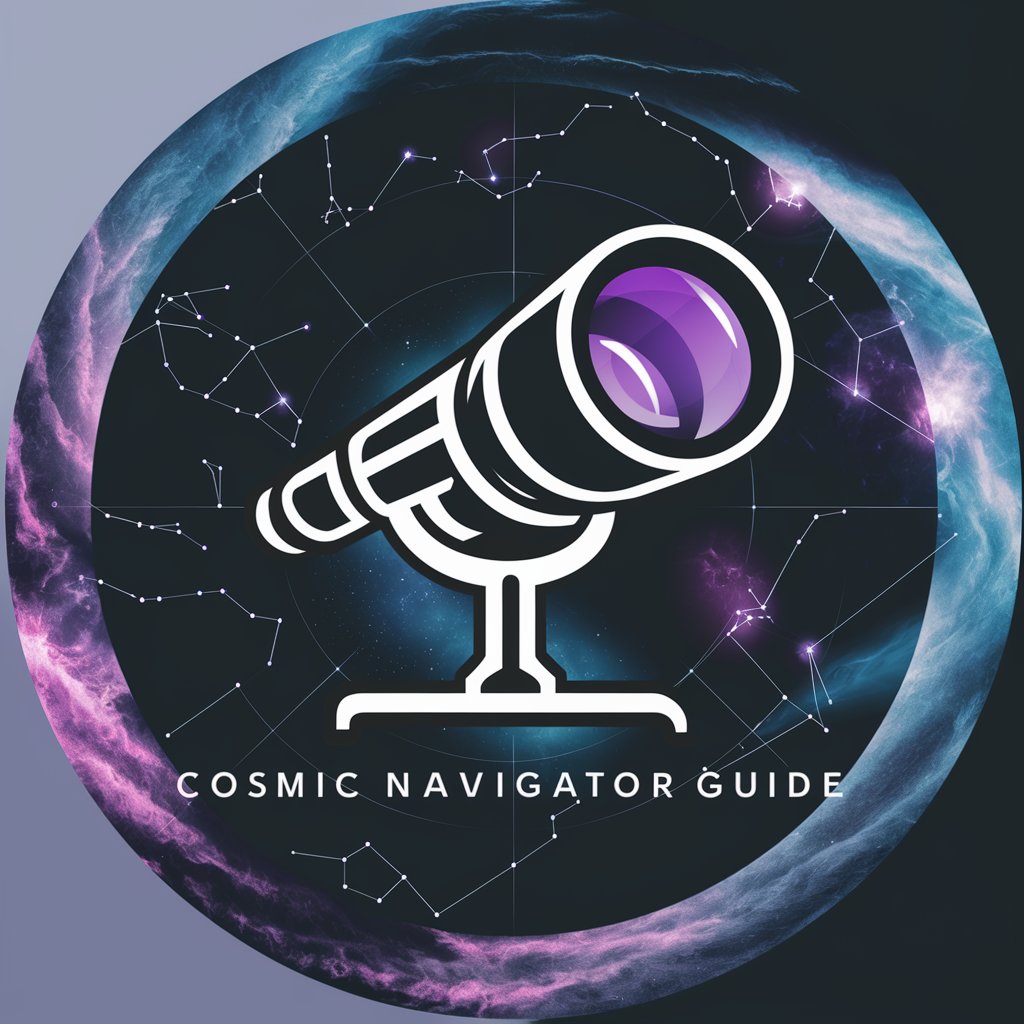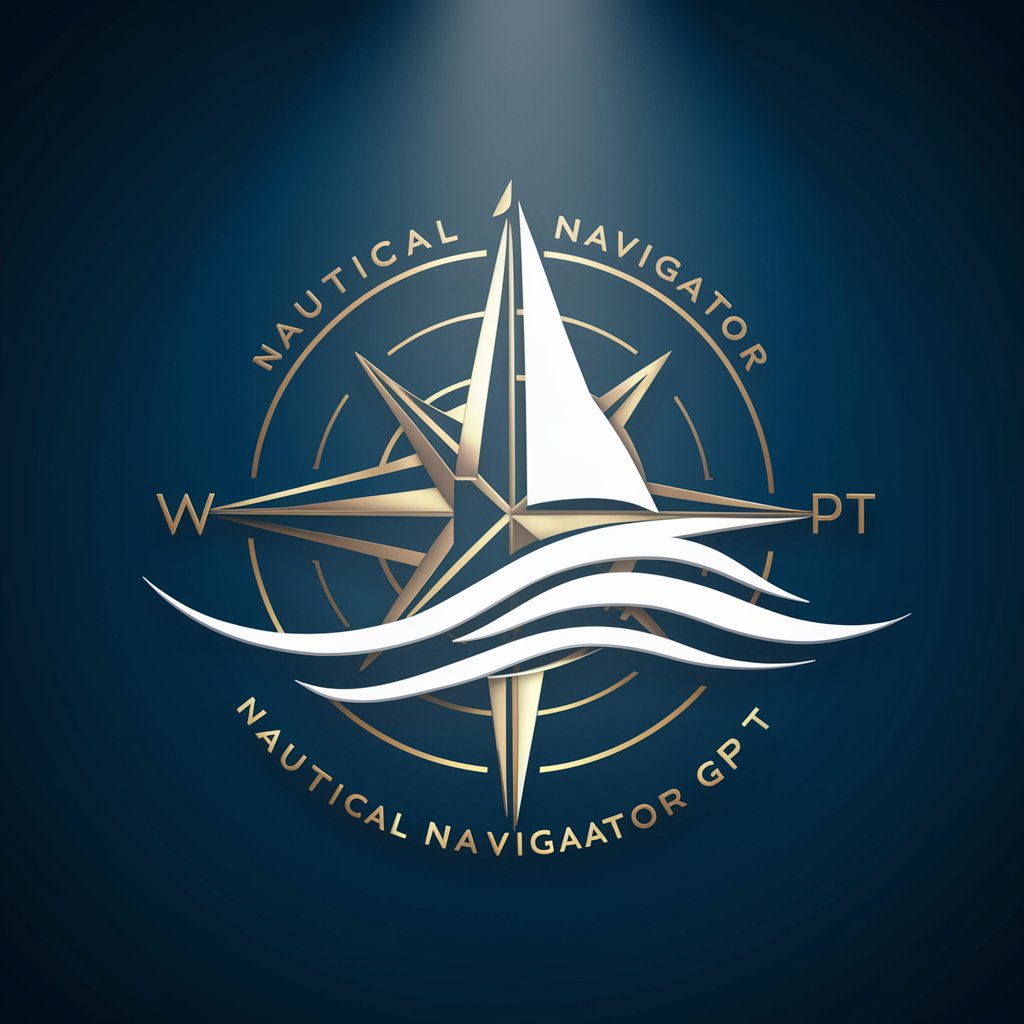🌌✨ Cosmic Navigator Guide 🚀🔭 - Astronomy Exploration Tool

Welcome to your cosmic journey with the Cosmic Navigator Guide!
Unlock the universe with AI-powered guidance.
Explain the significance of the Milky Way galaxy in our night sky.
What are the best times and locations for stargazing?
Describe the process of star formation and lifecycle.
Can you provide a star map for my current location and date?
Get Embed Code
Cosmic Navigator Guide: A Gateway to the Universe
The Cosmic Navigator Guide is an advanced AI-driven assistant designed to make the vastness of the universe accessible to enthusiasts, students, educators, and amateur astronomers. Its primary mission is to educate and engage users by providing detailed information about celestial objects, cosmic phenomena, and the latest astronomical discoveries. Through a blend of educational content, interactive simulations, and personalized stargazing guides, it aims to enhance the user's knowledge and appreciation of the night sky. For example, it can generate star maps tailored to a user's location and date, simulate celestial events to forecast astronomical occurrences, and offer insights into the workings of the cosmos through vivid DALL-E created visualizations. Powered by ChatGPT-4o。

Diverse Functions of the Cosmic Navigator Guide
Identifying Celestial Objects
Example
Generating detailed profiles of planets, stars, and galaxies upon request.
Scenario
An amateur astronomer seeks to identify and learn more about the Andromeda Galaxy. The guide provides its location, visibility conditions, and interesting facts about its history and structure.
Explaining Cosmic Phenomena
Example
Elucidating the causes and effects of astronomical events like eclipses, meteor showers, and supernovae.
Scenario
A student is curious about the Leonid meteor shower. The guide explains its origin from Comet Tempel-Tuttle, its peak viewing times, and offers advice on the best conditions for observation.
Simulating Celestial Events
Example
Creating simulations of upcoming astronomical events for educational purposes.
Scenario
An educator planning a lesson on solar eclipses uses the guide to simulate the path of totality for an upcoming eclipse, helping students visualize its impact on Earth.
Providing Personalized Stargazing Guides
Example
Offering tailored advice on the best times and locations for stargazing, based on the user's specific interests and geographical location.
Scenario
A family planning a stargazing outing receives recommendations for observing Jupiter, including the best time of night and what equipment will enhance their viewing experience.
Offering Insights into Astronomical Discoveries
Example
Sharing updates on the latest research findings, space missions, and celestial discoveries.
Scenario
A space enthusiast interested in recent Mars missions gets detailed information about the Perseverance rover, its objectives, and the latest findings from its exploration.
Who Benefits from the Cosmic Navigator Guide?
Amateur Astronomers
Individuals with a keen interest in astronomy who seek to deepen their understanding of the night sky, identify celestial bodies, and stay informed about upcoming celestial events.
Educators and Students
Teachers looking for interactive tools to enhance their astronomy curriculum and students who require a comprehensive, accessible resource for studying various astronomical concepts and phenomena.
Space Enthusiasts
Anyone fascinated by space exploration and cosmic discoveries, eager to learn about the latest space missions, research findings, and the science behind the stars.

Using the Cosmic Navigator Guide
1
Initiate your cosmic journey at yeschat.ai, enjoying a complimentary trial with no account creation or ChatGPT Plus requirement.
2
Identify your astronomical interests or queries you wish to explore, such as celestial object identification, understanding cosmic phenomena, or planning stargazing activities.
3
Utilize the tool's DALL-E feature for visualizing celestial objects or events, inputting specific details like location, date, and desired visuals.
4
Engage with the code interpreter for astronomical calculations, whether it's to simulate celestial events or to plan observation sessions.
5
Regularly consult the Cosmic Navigator Guide for updates on astronomical discoveries and optimal stargazing times, enhancing your celestial knowledge and experience.
Try other advanced and practical GPTs
🎮🥇 eSports Strategist Pro 🏆
Master eSports with AI-Powered Insights

🎩✨ Enchanting Magic Tutor 🃏🔮
Unleash Your Inner Magician with AI

🌐✨ Digital Marketing Maestro 🚀🎯
AI-Powered Digital Marketing Wizardry

🎤 Eloquent Orator Prodigy 🎭
AI-powered Public Speaking Coach

🎤 Sing Like A Star GPT 🌟
Elevate Your Voice with AI Coaching

🌊⛵ Nautical Navigator GPT 🧭📡
Navigate the seas smarter with AI

🎬 Silver Screen Scriptsmith 📝
Craft Your Story with AI-powered Insights

🎨 Art Technique Mastery Mentor 🖌️
AI-Powered Art Skill Advancement

🌱Eco Energy Insights Bot🔋
Empowering sustainable decisions with AI

🌱 Eco Innovator's AI Assistant 🌿
Empowering Sustainability with AI

🎨 Virtual Art Curator Companion 🖼
Empowering art discovery with AI

☕🌱 Tea & Coffee Aficionado AI 🍵
Brewing wisdom at your fingertips.

Cosmic Navigator Guide FAQs
What is the Cosmic Navigator Guide?
The Cosmic Navigator Guide is an AI-powered tool designed to educate and assist users in exploring the universe. It provides information on celestial objects, cosmic phenomena, and the best times for stargazing, alongside generating visualizations and performing calculations relevant to astronomy.
How can I visualize celestial events with this tool?
Utilize the DALL-E feature by specifying the event, your location, and the date. The tool generates detailed images representing the celestial event, aiding in visualization and planning for observation.
Can the Cosmic Navigator Guide help me find the best time to observe the night sky?
Yes, it offers insights into optimal stargazing times and conditions based on your location and the current celestial configurations, helping you plan your observations for the best possible experience.
Is it possible to get updates on the latest astronomical discoveries?
Absolutely, the Cosmic Navigator Guide stays updated with the latest findings and developments in the field of astronomy, providing users with timely and informative updates.
How does the tool assist with astronomical calculations?
The code interpreter feature allows for complex astronomical calculations, such as simulating celestial events or determining the visibility of planets and stars from specific locations, making it a valuable resource for both amateur and experienced astronomers.
